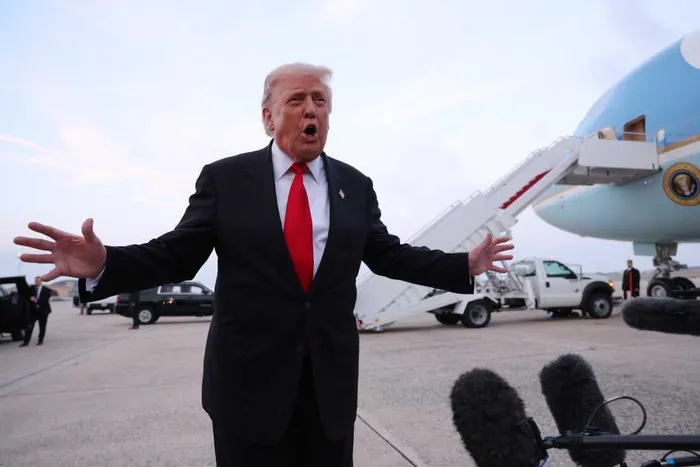
Is Donald Trump a peace monger or war monger?
Image: AFP
Max Boot
Is President Donald Trump a peacemaker or a warmonger? An interventionist or an isolationist? The answer is: yes. He contains multitudes, and it’s nearly impossible to sort out or explain the disparate strands of his foreign policy.
Any coherence imposed on Trump’s often self-contradictory approach is largely an artificial construct. Even the label Trump has adopted - “America First” - was suggested to him in 2016 by David Sanger of the New York Times; Trump didn’t think of it on his own, and he certainly has not faithfully adhered to it, as even some of his supporters have noticed. Rep. Marjorie Taylor Greene (R-Georgia) said on CNN last week that Trump’s “nonstop tours around the world and nonstop meetings with foreign leaders is not America First. It’s just not. I think domestic policy should be the most important issue.”
It’s clear Trump won’t be deterred by such criticism as he tries to carve out a place in history - and win that Nobel Peace Prize he covets. Nor does Trump seem to care that the specifics of his policies are often at odds. He seems to make decisions based on a whim, often driven by disinformation. There’s no “White genocide” in South Africa, for example, but Trump has cited that myth in making Afrikaners virtually the only refugees he will admit.
Trump’s pronouncements are so often unexpected and disconnected from reality that they leave foreign policy scholars, and foreign leaders, bewildered. Two recent headlines are typical: “Trump threat of military action in Nigeria prompts confusion and alarm” and “Trump’s Vow to Resume Nuclear Tests Leaves Experts Puzzled.”
Both articles were prompted by social media posts. On Oct. 29, Trump wrote: “Because of other countries testing programs, I have instructed the Department of War to start testing our Nuclear Weapons on an equal basis. That process will begin immediately.”
Yet, with the exception of North Korea, no country has openly tested a nuclear weapon in the 21st century. Russia recently tested what it claims are a nuclear-powered cruise missile and underwater drone, and it’s possible that Trump simply confused nuclear propulsion with nuclear explosives. Or perhaps Trump is referring to unverified reports that Russia and China may have engaged in ultralow-yield nuclear tests to verify the safety of their arsenals. But that’s no threat, and no reason to resume U.S. nuclear testing. American officials have said that such tests are not needed to maintain the nation’s nuclear arsenal.
Yet, when the U.S. president says something, no matter how badly informed, it has an impact. Thus, Russia is now threatening to proceed with its own nuclear testing. That’s moving in the wrong direction from Trump’s stated goal of denuclearization. Unless talking about setting off nukes is intended as a spur to eliminating them? Who knows what Trump is thinking?
Then there is Trump’s social media post about Nigeria, which he wrote, according to The Post, after seeing a Fox News segment on the subject. On Nov. 1, he posted, “If the Nigerian Government continues to allow the killing of Christians, the U.S.A. will immediately stop all aid and assistance to Nigeria, and may very well go into that now disgraced country, ‘guns-a-blazing,’ to completely wipe out the Islamic Terrorists who are committing these horrible atrocities. I am hereby instructing our Department of War to prepare for possible action.”
Trump’s defense secretary, Pete Hegseth, immediately responded “Yes sir” on X, and the Pentagon has duly drawn up options for U.S. military intervention in a country of more than 230 million people. Those plans reportedly range from supporting Nigerian government forces in battling Boko Haram and other Islamist groups to conducting airstrikes in northern Nigeria. Few analysts think that any of those actions would end Nigeria’s endemic political violence, which afflicts Muslim communities as well as Christians. Cutting off all U.S. aid will simply heighten instability.
It’s bizarre for a president who brags about all the wars he’s ended to suggest going “guns-a-blazing” into Nigeria. Or, potentially, into Venezuela: Trump has now assembled the largest U.S. naval armada in the Caribbean since the 1962 Cuban missile crisis, and he is blustering about toppling Venezuelan dictator Nicolás Maduro.
But it’s no more peculiar than having a president who is cutting foreign aid to the world’s poorest countries, with catastrophic consequences for needy people, commit $20 billion to rescue Argentina from its fiscal irresponsibility. This looks like an Argentina First foreign policy, and it seems to be primarily motivated not by U.S. national interests but by Trump’s affinity for Argentina’s libertarian president, Javier Milei.
Why threaten to attack Venezuela or Nigeria? Why vow to test nuclear weapons? Why bail out Argentina? It makes little sense, but the incoherence of Trump’s approach also doesn’t much matter, certainly not to most of his followers, with the unexpected exception of Greene. Sen. Tommy Tuberville (R-Alabama) is a noninterventionist but said he would back Trump if the administration intervened in Nigeria. Sen. Cynthia Lummis (R-Wyoming), another America First diehard, said, “I agree with every single thing he’s saying.”
MAGA loyalists will go wherever Trump leads, and a lot of them actually seem to appreciate the discordant combination of Trump mediating conflicts while simultaneously saber-rattling. They might feel different if he actually got embroiled in another ground war, but that’s where he appears to draw the line - he’s willing to order airstrikes (e.g., against Iran and the Houthis in Yemen) but, so far, not actual invasions. Trump’s incoherence serves to keep the world off balance and to keep the spotlight on him. It’s mainly a problem for foreign policy analysts who struggle to figure out what he’s up to and what he might do next. But, from his perspective, driving “elitists” and “globalists” bonkers is a bonus.